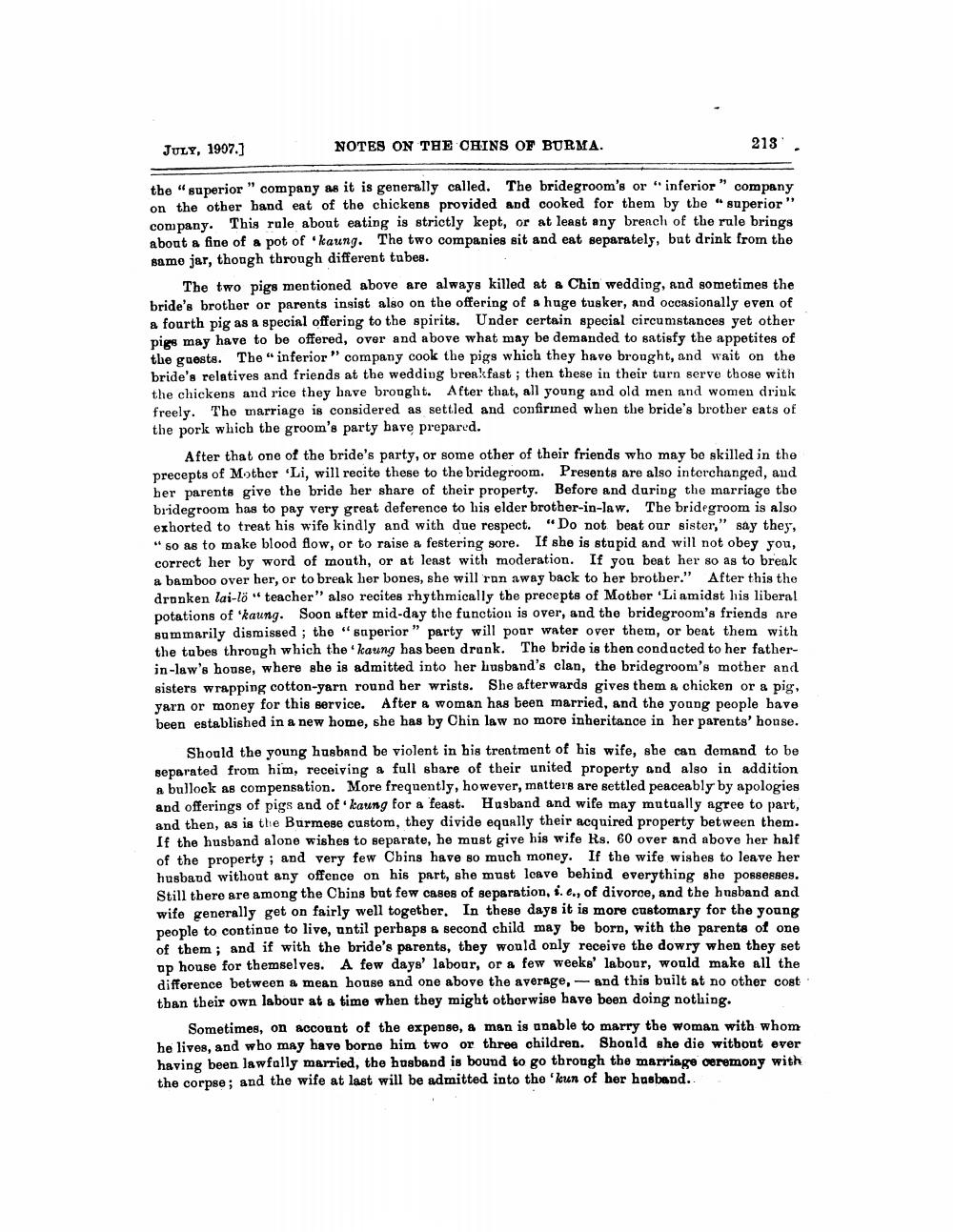________________
213
JULY, 1997.]
NOTES ON THE CHINS OF BURMA.
the "superior" company as it is generally called. The bridegroom's or "inferior" company on the other hand eat of the chickens provided and cooked for them by the "superior" company. This rule about eating is strictly kept, or at least any breach of the rule brings about a fine of a pot of kaung. The two companies sit and eat separately, but drink from the same jar, though through different tubes.
The two pigs mentioned above are always killed at a Chin wedding, and sometimes the bride's brother or parents insist also on the offering of a huge tusker, and occasionally even of a fourth pig as a special offering to the spirits. Under certain special circumstances yet other pigs may have to be offered, over and above what may be demanded to satisfy the appetites of the guests. The "inferior" company cook the pigs which they have brought, and wait on the bride's relatives and friends at the wedding breakfast; then these in their turn serve those with the chickens and rice they have brought. After that, all young and old men and women drink freely. The marriage is considered as settled and confirmed when the bride's brother eats of the pork which the groom's party have prepared.
After that one of the bride's party, or some other of their friends who may be skilled in the precepts of Mother 'Li, will recite these to the bridegroom. Presents are also interchanged, and her parents give the bride her share of their property. Before and during the marriage the bridegroom has to pay very great deference to his elder brother-in-law. The bridegroom is also exhorted to treat his wife kindly and with due respect. "Do not beat our sister," say they, "so as to make blood flow, or to raise a festering sore. If she is stupid and will not obey you, correct her by word of mouth, or at least with moderation. If you beat her so as to break a bamboo over her, or to break her bones, she will run away back to her brother." After this the drunken lai-lö"teacher" also recites rhythmically the precepts of Mother 'Li amidst his liberal potations of 'kaung. Soon after mid-day the function is over, and the bridegroom's friends are summarily dismissed; the "superior" party will pour water over them, or beat them with the tubes through which the 'kaung has been drunk. The bride is then conducted to her fatherin-law's house, where she is admitted into her husband's clan, the bridegroom's mother and sisters wrapping cotton-yarn round her wrists. She afterwards gives them a chicken or a pig, yarn or money for this service. After a woman has been married, and the young people have been established in a new home, she has by Chin law no more inheritance in her parents' house.
Should the young husband be violent in his treatment of his wife, she can demand to be separated from him, receiving a full share of their united property and also in addition a bullock as compensation. More frequently, however, matters are settled peaceably by apologies and offerings of pigs and of 'kaung for a feast. Husband and wife may mutually agree to part, and then, as is the Burmese custom, they divide equally their acquired property between them. If the husband alone wishes to separate, he must give his wife Rs. 60 over and above her half of the property; and very few Chins have so much money. If the wife wishes to leave her husband without any offence on his part, she must leave behind everything she possesses. Still there are among the Chins but few cases of separation, i. e., of divorce, and the husband and wife generally get on fairly well together. In these days it is more customary for the young people to continue to live, until perhaps a second child may be born, with the parents of one of them; and if with the bride's parents, they would only receive the dowry when they set up house for themselves. A few days' labour, or a few weeks' labour, would make all the difference between a mean house and one above the average, and this built at no other cost than their own labour at a time when they might otherwise have been doing nothing.
Sometimes, on account of the expense, a man is unable to marry the woman with whom he lives, and who may have borne him two or three children. Should she die without ever having been lawfully married, the husband is bound to go through the marriage ceremony with the corpse; and the wife at last will be admitted into the 'kun of her husband..




